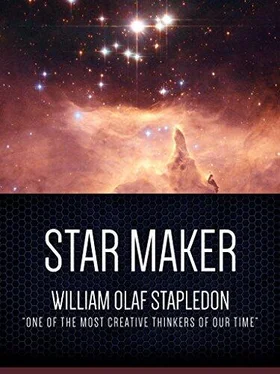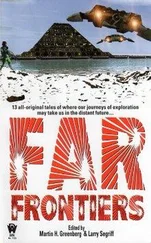Probing as best we could beyond the formal similarity of spirit which gave us access to the bird-clouds, we discovered painfully how to see with a million eyes at once, how to feel the texture of the atmosphere with a million wings. We learned to interpret the composite percepts of mud-flats and marshes and great agricultural regions, irrigated twice daily by the tide. We admired the great tide-driven turbines and the system of electric transport of freight. We discovered that the forests of high concrete poles or minarets, and platforms on stilts, which stood in the shallowest of the tidal areas, were nurseries where the young were tended till they could fly.
Little by little we learned to understand something of the alien thought of these strange beings, which was in its detailed texture so different from our own, yet in general pattern and significance so similar. Time presses, and I must not try even to sketch the immense complexity of the most developed of these worlds. So much else has still to be told. I will say only that, since the individuality of these bird-clouds was more precarious than human individuality, it was apt to be better understood and more justly valued. The constant danger of the bird-clouds was physical and mental disintegration. Consequently the ideal of the coherent self was very prominent in all their cultures. On the other hand, the danger that the self of the bird-cloud would be psychically invaded and violated by its neighbors, much as one radio station may interfere with another, forced these beings to guard more carefully than ourselves against the temptations of the herd, against drowning the individual cloud's self in the mob of clouds. But again, just because this danger was effectively guarded against, the ideal of the world-wide community developed without any life-and-death struggle with mystical tribalism, such as we know too well. Instead the struggle was simply between individualism and the twin ideals of the world-community and the world-mind.
At the time of our visit world-wide conflict was already breaking out between the two parties in every region of the planet. The individualists were stronger in one hemisphere, and were slaughtering all adherents of the world-mind ideal, and mustering their forces for attack on the other hemisphere. Here the party of the world-mind dominated, not by weapons but by sheer radio-bombardment, so to speak. The pattern of ethereal undulations issuing from the party imposed itself by sheer force on all recalcitrants. All rebels were either mentally disintegrated by radio-bombardment or were absorbed intact into the communal radio system. The war which ensued was to us astounding. The individualists used artillery and poison gas. The party of the world-mind used these weapons far less than the radio, which they, but not their enemies, could operate with irresistible effect. So greatly was the radio system strengthened, and so adapted to the physiological receptivity of the avian units, that before the individualists had done serious harm, they found themselves engulfed, so to speak, in an overwhelming torrent of radio stimulation. Their individuality crumbled away. The avian units that made up their composite bodies were either destroyed (if they were specialized for war), or reorganized into new clouds, loyal to the world-mind.
Shortly after the defeat of the individualists we lost touch with this race. The experience and the social problems of the young world-mind were incomprehensible to us. Not till a much later stage of our adventure did we regain contact with it.
Others of the worlds inhabited by races of bird-clouds were less fortunate. Most, through one cause or another, came to grief. In many of them the stresses of industrialism or of social unrest brought about a plague of insanity, or disintegration of the individual into a swarm of mere reflex animals. These miserable little creatures, which had not the power of independent intelligent behavior, were slaughtered in myriads by natural forces and beasts of prey. Presently the stage was clear for some worm or amoeba to reinaugurate the great adventure of biological evolution toward the human plane.
In the course of our exploration we came upon other types of composite individuals. For instance, we found that very large dry planets were sometimes inhabited by populations of insect-like creatures each of whose swarms of nests was the multiple body of a single mind. These planets were so large that no mobile organism could be bigger than a beetle, no flying organism bigger than an ant. In the intelligent swarms that fulfilled the part of men in these worlds, the microscopic brains of the insect-like units were specialized for miscroscopic functions within the group, much as the members of an ant's nest are specialized for working, fighting, reproduction, and so on. All were mobile, but each class of the units fulfilled special "neurological" functions in the life of the whole. In fact they acted as though they were special types of cells in a nervous system.
In these worlds, as in the worlds of the bird-clouds, we had to accustom ourselves to the unified awareness of a huge swarm of units. With innumerable hurrying feet we crept along Lilliputian concrete passages, with innumerable manipulatory antennae we took part in obscure industrial or agricultural operations, or in the navigation of toy ships on the canals and lakes of these flat worlds. Through innumerable many-faceted eyes we surveyed the plains of moss-like vegetation or studied the stars with minute telescopes and spectroscopes.
So perfectly organized was the life of the minded swarm that all routine activities of industry and agriculture had become, from the point of view of the swarm's mind, unconscious, like the digestive processes of a human being. The little insectoid units themselves carried on these operations consciously, though without understanding their significance; but the mind of the swarm had lost the power of attending to them. Its concern was almost wholly with such activities as called for unified conscious control, in fact with practical and theoretical invention of all kinds and with physical and mental exploration.
At the time of our visit to the most striking of these insectoid worlds the world-population consisted of many great nations of swarms. Each individual swarm had its own nest, its Lilliputian city, an area of about an acre, in which the ground was honey-combed to a depth of two feet with chambers and passages. The surrounding district was devoted to the cultivation of the moss-like food-plants. As the swarm increased in size, colonies might be founded beyond the range of the physiological radio system of the parent swarm. Thus arose new group-individuals. But neither in this race, nor in the race of bird-clouds, was there anything corresponding to our successive generations of individual minds. Within the minded group, the insectoid units were ever dying off and giving place to fresh units, but the mind of the group was potentially immortal. The units succeeded one another; the group-self persisted. Its memory reached back past countless generations of units, fading as it receded, and finally losing itself in that archaic time when the "human" was emerging from the "sub-human." Thus the civilized swarms had vague and fragmentary memories of every historical period.
Civilization had turned the old disorderly warrens into carefully planned subterranean cities; had turned the old irrigation channels into a widespread mesh of waterways for the transport of freight from district to district; had introduced mechanical power, based on the combustion of vegetable, matter; had smelted metals from outcrops and alluvial de-posits; had produced the extraordinary tissue of minute, almost microscopic machinery which had so greatly improved the comfort and health of the more advanced regions; had produced also myriads of tiny vehicles, corresponding to our tractors, trains, ships; had created class distinctions between those group-individuals that remained primarily agricultural, those that were mainly industrial, and those that specialized in intelligent co-ordination of their country's activities. These last became in time the bureaucratic tyrants of the country, Owing to the great size of the planet and the extreme difficulty of long-distance travel by creatures so small as the insectoid units, civilizations had developed independently in a score of insulated regions; and when at last they came in contact, many of them were already highly industrialized, and equipped with the most "modern" weapons. The reader may easily imagine what happened when races that were in most cases biologically of different species, and anyhow were I completely alien in customs, thought, and ideals, suddenly found themselves in contact and in conflict. It would be wearisome to describe the insane warfare which ensued. But it is of interest to note that we, the telepathic visitors from regions remote in time and space, could communicate with these warring hosts more easily than one host could communicate with another. And through this power we were actually able to play an important part in the history of this world. Indeed, it was probably through our mediation that these races were saved from mutual destruction. Taking up positions in "key" minds on each side of the conflict, we patiently induced in our hosts some insight into the mentality of the enemy. And since each of these races had already passed far beyond the level of sociality known on the Earth, since in relation to the life of his own race a swarm-mind was capable of true community, the realization of the enemy as being not monstrous but essentially humane, was enough to annihilate the will to fight.
Читать дальше









![Олаф Стэплдон - Создатель звезд [сборник litres]](/books/433148/olaf-stepldon-sozdatel-zvezd-sbornik-litres-thumb.webp)


